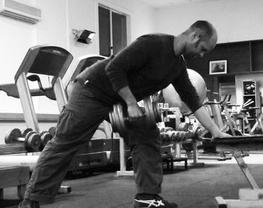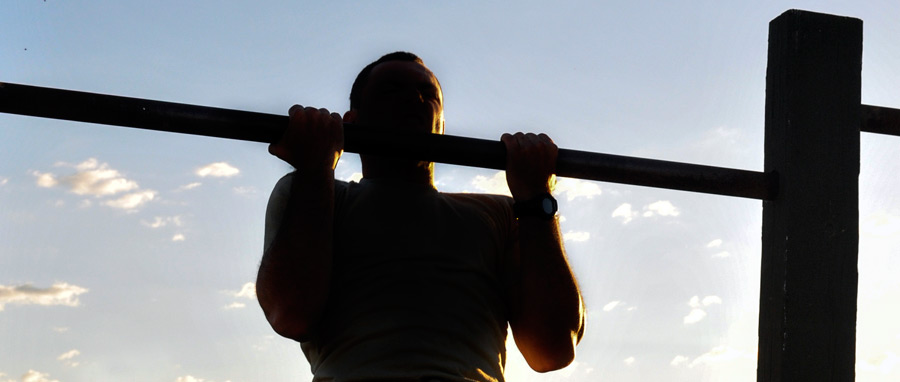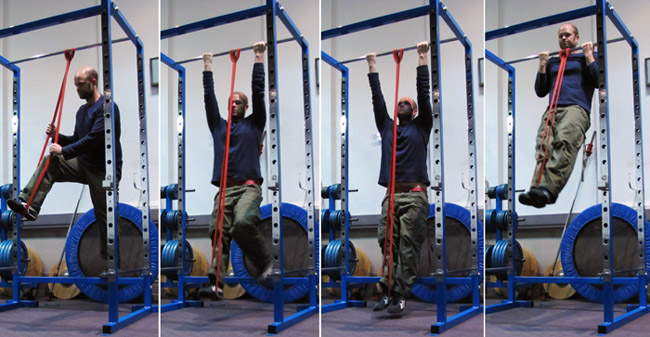|
You’ll often hear people say that if you want to improve your chin-ups, it helps if you can lose weight. Not from your back muscles, of course, and if you can already do half a dozen chin-ups or so, getting a bit lighter might well increase the number of reps you can do by a few. But to what end? Getting stronger will achieve the same result, and if you cannot do any chin-ups, or if you cannot do any push-ups, losing weight isn’t magically going to give you the skill or strength to move your body through space. It sounds logical, but if you’re not strong enough to do a single rep, the sad truth is that losing a few kilograms isn’t going to make a difference. But you can, over time, grow consistently stronger. It’ll take longer than you expect. I had a new client start with me in 2014 and it took her about a year of training with me to get to the point where she could do one unassisted chin-up. She’s in her fifties, and she actually achieved that rather quickly, but it varies so much for everyone. And in real life, shit comes up all the damn time, and that shit will interfere with your training and progress. If you can make it to the gym fifty or a hundred times in a year, you’re doing pretty damn well. And if you’re only practicing chin-ups once per week, of course it’ll take a long time. But it’s not our job to make sure that shit doesn’t come up all the time, it’s only our responsibility to live our lives, whatever that means to you, and training should serve your life, it should make it better in some way – you shouldn’t have to sacrifice your life in the name of training. I remember one skill I used to practice in martial arts, it was challenging and I couldn’t get it. After quite a long time, I realised I was only practicing it maybe twelve to fifteen times in a week. Of course I wasn’t getting it! How could I – even though I trained often – when that particular skill was practiced so few times? I started increasing my attempts, and in time I succeeded. We are used to thinking of chin-ups as a goal themselves, rather than a technique for training, and if you do think of them as a goal, yeah it’s great to be able to do a lot of them and thereby impress your friends while striking fear into the hearts of your enemies. But if you think of the chin-up as you do any other training technique for the development of strength, what is the principle for growing stronger over time? Practice an appropriate exercise, use appropriate loading parameters, and over time try to increase loading or repetitions. You know you’re stronger because you can do more than you used to be able to do. The chin-up, in context and in the most fundamental way, while symbolic and cool and shit, is just a strength training technique. As such, the reason for practice is to stimulate the body to grow stronger, not lighter. And it is one of many ‘upper body pulling’ exercises that you can use to increase the strength of your back, arms and shoulders. There are easier and harder exercises that exist in the world, it is simply one exercise in a continuum of increasingly challenging exercises. But somehow, it has become symbolic. If you have read my series on chin-ups, you will have been introduced to a range of exercises that are easier, that can help you develop your back and shoulder awareness and strength, and move you towards being able to practice chin-ups. Of course, there are harder exercises too, such as the round-the-world chin, human flags, and front levers. I was chatting with a friend, and we realised together – could you imagine – regressing the bench press in the name of training? If anyone told you that the way to progress your bench was to reduce the amount of weight you were lifting over the long term, you’d think they were nuts. No. Instead, they tell you to eat enough, eat right to build your muscles, train right and grow strong. You don’t improve your bench by trying to lift less weight in the future. It just sounds ridiculous. Over time you may vary the load, you may do heavy, low-rep training, you may do high-rep ‘pump’ style sets, you may do many or fewer sets, but over time you’re trying to get stronger. Because fundamentally, the bench press is a technique you train in order to develop your strength. That’s the objective, that’s why athletes are tested for it all the time – it’s a controversial choice, but coaches want to see that the athlete has become stronger. But when it comes to chin-ups everyone’s like yeah – that makes sense. Get lighter. We all want to get lighter. If you were a long way off benching 50 kilos, you could try lightening the bar to 45, but it still wouldn’t help you if you’re too far away from your target. What would help you? Training for strength. And if you could do a rep or two at 50 kilos, what then? If you reduced the weight to 45, you’d be able to do more, but for what purpose? With chin-ups, if you just want to de-load the body, if you just want to lift lighter, use a band for assistance. Or the controversial kipping technique. You don’t need to make yourself lighter, in order to regress the technique. Because that’s what we’re really talking about when people tell you to lose weight to improve your chin-ups, that method is simply a regression of the technique. There are good reasons to train in a variety of reps ranges, utilizing easier or harder techniques. But if you could bench a given weight for only one or two reps, your ultimate goal would not be to bench something slightly lighter for as many as possible. Your ultimate goal would be the same as it always is – get better at benching what you can, and try to bench more in future. We want chin-ups to be easier, we want to be able to do a bunch of them effortlessly. That’d be cool. But a human body, even a light one, is always going to be heavy. You’re only ever going to be so light. And the way to get better at lifting 70 + kilos, 90 + kilos, is always going to be via training your strength. There’s no way around that, and whittling a couple of kilos off your body is never going to be as effective as increasing the strength of your arms and back. And that requires food, damnit. Training, obviously. And rest. But lots of food. One of the best things I ever did for developing my chin-ups was putting to rest the fear of getting heavier. Eat for strength. The fear is strong, but it makes an amazing difference if you can start eating more. I remember years ago I was taught the scapular-pull; it was the most helpful and novel technique, at the time it rapidly increased my ability to do chin-ups in only a few months. In more recent years, I started deadlifting with conviction. When I reached the point where I could deadlift a weight greater than my own bodyweight, it was a game-changer again. When you’re used to pulling a bar that weighs more than you do, hanging from a bar suddenly becomes relatively easy. You can see it when you’ve got an eye for it – if someone’s struggling with their grip, they can’t straighten their elbows, the shoulders get all jammed, the ribs can’t move properly – it makes smooth pulling almost impossible. And believe it or not, most people I have trained can learn to deadlift heavier than they are, easier than they can learn to do chin-ups. Any exercise that trains your grip may be useful, but deadlifting heavy, that was a game-changer too. Yet more recently again, for a year or so I could not do a single chin-up because of a stubborn shoulder injury. I’m heavier now than ever before, and it took a long time to get back to them. But the two most useful techniques that I employed over the last half a year or so were these: one arm dumbbell rows and simply hanging from monkey bars. Frequently. It was an interesting combination, because just hanging around moved me from a sets-and-reps mentality to more of a simple experience-the-training kind of mentality, and it made my shoulder solid and stable again. It was not about fatigue, not about technique… it was just time spent hanging from stuff. Just like a kid would hang from the monkey bars. This was a luxury afforded to me, because I work in a gym that has adult-sized monkey bars right in the middle of the room. It’s a rare privilege; I’d just walk past and have a bit of a hang or a swing.  And the dumbbell rows, these were done for sets and reps, but they renewed my ability to pull my upper arm back towards my ribs, which is what you need to be good at if you want to be able to complete the chin up. The hanging from bars helped my starting position, the rows helped the completed position, and the middle bit was just sorted out by practicing heavy pulling in a general sense. You know the funny thing though? As much as I’ve practiced biceps curls in my time, either with dumbbells or a barbell – they never seem to have helped me improve my chin-ups. Despite the fact that they’re pure elbow flexion. This is not surprising to me, but it’s worth saying – ultimately it’s because chin-ups are all about the back. The arms, once you’re strong enough to hold on, the arms actually do very little. But the chin-up, if it’s useful for you, it’s because it can be a great tool, a great technique for helping maintain and improve strength and function. You can demystify it. It is just one technique, one of many, and they are all useful for different purposes, in different contexts. And then broadly, developing your strength – there are efficient and inefficient ways to train, many of us argue over the tiniest of details, but the principle is simple. Eat plentifully – this is the part we usually neglect, it really does require a lot of food if you want to grow strong – and practice challenging exercises until you become better at them. Then repeat – seek out challenging exercises and practice them. Training does not require discipline. Instead, it teaches you patience. Because it always takes longer than you think, than we expect. Training makes you wait, and wait, and wait for rewards. So make sure whatever you’re doing, it must feel worthwhile, and if you have goals, there must be steps. What makes us stronger is not trying to be light, but pulling on things which are heavy. You can be that heavy thing! In the end – it’s just more of the same old thing: the fantasy of being thin. If only I were thinner, this thing would be easier! We’ve all been there. But life and training – they’re not about that. Wherever you are right now, you can work with that. You don’t need to wait until you’re thin to start. Training is supposed to serve you now, and the key for that is specificity. Work towards whatever you want to work on, and train in a way that is appropriate to your present situation.
2 Comments
11/4/2017 03:09:22 am
I thought that you had to be skinny or thin to make exercising easy. However, when I enrolled for a monthly membership in the gym I saw a group of skinny people having a hard time lifting their own weights. My instructor told me that when you're skinny it doesn't mean exercises will be easier, but training will. Training every single day and putting out a lot of efforts is the key to make things easier. It doesn't just occur in exercising, but in everything we do. Doing something constantly will make you more used to do this thing.
Reply
1/10/2023 09:28:59 pm
"I am reading a blog on this website for the first time, and I would like to tell you that the quality of the content is up to the mark. It is very well written, also helpful information. I will undoubtedly make use of your research resources. I would really thank you for the information provided in such an apt way. It answered all my queries. I will indeed read all the blogs from now on.
Reply
Leave a Reply. |


